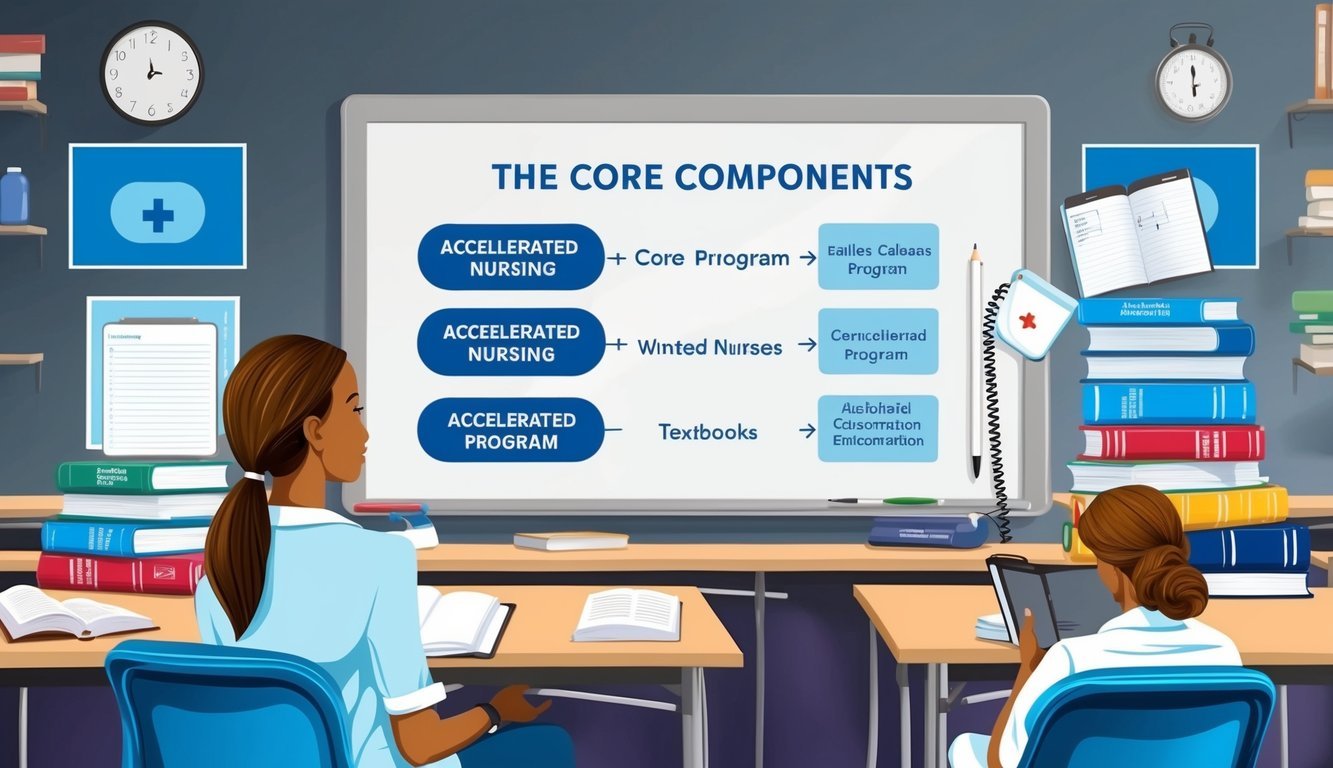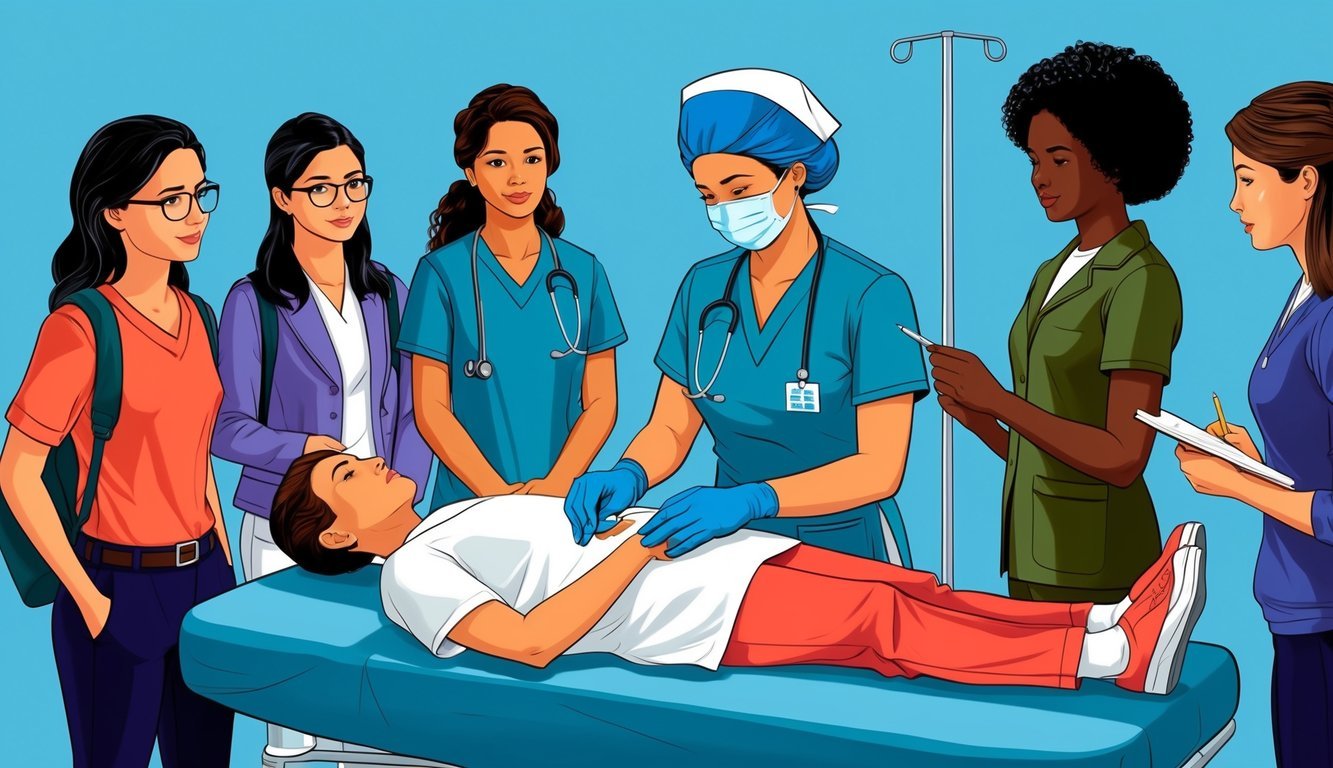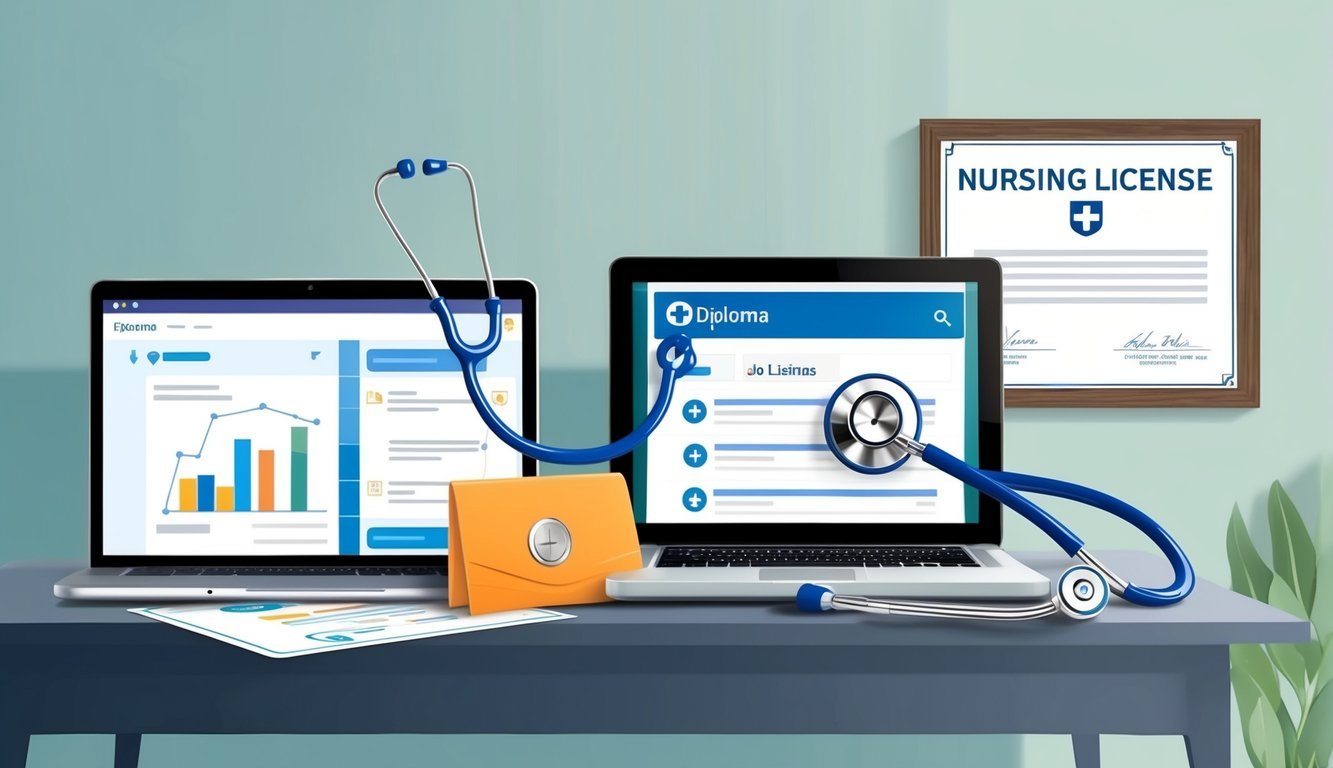Accelerated nursing programs in Minnesota offer a fast-track option for individuals seeking to enter the nursing field.
These programs are designed for those who already hold a bachelor’s degree in another area and wish to earn a Bachelor of Science in Nursing (BSN) in a shorter timeframe.
Many programs are available, and you can complete your nursing degree in as little as 12 to 18 months.
This makes it a compelling choice for career changers.
As you explore these options, you’ll find that Minnesota’s nursing education landscape is rich with opportunities.
Programs like those at Saint Catherine University and Bethel University provide innovative curricula and essential clinical experiences, preparing you for the challenges of nursing.
The combination of rigorous training and hands-on practice is crucial in developing the skills needed for a successful nursing career in Minnesota.
Understanding the core components of these programs can help you make an informed decision.
Take time to review admission requirements, curriculum details, and the support available for licensing after graduation.
This knowledge will guide you as you take the next steps toward becoming a licensed nurse in Minnesota.
Key Takeaways
- Accelerated nursing programs can be completed in 12 to 18 months.
- Hands-on clinical experiences are essential for skill development.
- Knowing admission requirements helps you prepare for application.
Understanding Accelerated Nursing Programs
Accelerated nursing programs offer a fast track for individuals with a non-nursing bachelor’s degree to become Registered Nurses (RNs).
These programs, especially the Accelerated Bachelor of Science in Nursing (BSN), combine rigorous coursework with clinical practice in a condensed timeframe, enabling you to graduate and start your nursing career quicker.
Defining Accelerated BSN
An Accelerated BSN program is designed for students who already hold a bachelor’s degree in another field.
This program typically lasts 12 to 18 months and covers the same content as traditional BSN programs.
Key features include:
- Intensive curriculum: You will study essential nursing courses, including anatomy, pharmacology, and ethics, alongside hands-on clinical training.
- Full-time commitment: Expect to attend classes and clinicals several days a week.
Many colleges in Minnesota, such as Saint Catherine University, offer these programs to help you transition quickly into the nursing workforce.
For more details on Minnesota programs, check Accelerated Nursing Programs in Minnesota.
Benefits of an Accelerated Path
Choosing an accelerated path to your Bachelor of Science in Nursing has numerous advantages:
- Quick entry into the workforce: You can become a Registered Nurse in less than two years.
- High demand for nurses: The job market for nurses continues to grow, ensuring job security.
- Transferable skills: Your previous degree may provide you with valuable skills like critical thinking and communication.
In addition to these benefits, many accelerated programs offer flexible learning options, including hybrid classes.
With programs available like the one at Bethel University, you can find a suitable path that meets your needs while progressing quickly in your nursing career.
For more options, visit 10 Best Accelerated Nursing Programs in Minnesota Today.
Admission Requirements and Prerequisites

When considering an accelerated nursing program in Minnesota, you need to be aware of specific admission criteria and essential prerequisites.
Understanding these factors will help ensure you meet the requirements for entry into the program.
Admission Criteria
To gain entry into an Accelerated Bachelor of Science in Nursing (BSN) program, you typically need to meet several key criteria:
- Bachelor’s Degree: You must hold a bachelor’s degree from an accredited institution in a field other than nursing.
- GPA Requirements: Most programs require a minimum GPA, usually around 3.0. Some institutions may accept a lower GPA, such as 2.5, depending on the program.
- All Relevant Transcripts: You need to submit transcripts from all post-secondary institutions attended.
- Letters of Recommendation: Many programs ask for 1-3 letters from academic or professional references.
- Statement of Purpose: A well-written essay explaining your motivation and goals in nursing can strengthen your application.
Essential Prerequisites
Before enrolling in an accelerated nursing program, you need to complete certain prerequisites.
Common requirements often include:
- Human Anatomy and Physiology: Usually requires at least two semesters.
- Microbiology: A course in microbiology is often necessary.
- Statistics: A statistics course is important, as it relates to data analysis in nursing.
- Nutrition: Understanding nutrition is essential in patient care.
Here’s a summary of typical prerequisites:
| Course | Notes |
|---|---|
| Human Anatomy and Physiology | At least 2 semesters |
| Microbiology | Required |
| Statistics | Required |
| Nutrition | Required |
Check individual program websites for specific details, as requirements can differ between schools.
Core Components of the Curriculum

The curriculum for accelerated nursing programs in Minnesota includes various elements necessary for developing competent nursing professionals.
It emphasizes nursing coursework, hands-on clinical experiences, and innovative e-learning methods.
Nursing Coursework and Clinicals
In accelerated nursing programs, the coursework consists of essential nursing topics.
You will study subjects like anatomy, pharmacology, and nursing theory.
These courses are designed to provide you with a strong foundation in healthcare.
Clinical experiences are also a critical aspect.
You’ll participate in hands-on training in real healthcare settings.
This includes caring for patients under the supervision of experienced nurses.
Clinical learning experiences help you apply what you have learned in the classroom to real-world situations.
Experiential Learning and Labs
Skills labs are incorporated into the curriculum to enhance your hands-on experience.
In these labs, you will practice essential nursing skills using mannequins and medical equipment.
This environment allows for mistakes without risk to real patients.
Experiential learning enables you to gain confidence in performing procedures.
It also reinforces the importance of evidence-based practice.
Engaging in this type of learning prepares you for what you will encounter during clinical rotations.
E-Learning and Online Coursework
E-learning plays a vital role in accelerated nursing programs.
You will use an e-learning platform that enables access to course materials, discussions, and assignments online.
This flexibility allows you to learn at your own pace and manage your schedule effectively.
Online coursework often includes interactive modules, discussion boards, and assessments.
These tools promote engagement and understanding.
They make it easier to balance your education with other responsibilities, providing a modern approach to your nursing education.
In sum, the combined elements of nursing coursework, skills labs, and e-learning create a comprehensive learning experience tailored for future nurses.
Clinical Experiences and Skills Development

In accelerated nursing programs, hands-on clinical experiences are essential for skill development.
These experiences help you apply classroom knowledge in real-world healthcare settings.
Two main aspects of clinical training are clinical rotations and developing clinical judgment.
Clinical Rotations at Healthcare Providers
During your program, you will participate in clinical rotations at various healthcare providers.
These rotations are critical for gaining practical experience in different healthcare environments.
You might work in hospitals, clinics, or community health settings.
In these rotations, you will have the chance to interact with patients and healthcare teams.
This exposure allows you to practice essential nursing skills, such as taking vital signs, administering medications, and performing assessments.
Many programs, like those offered through Concordia College, ensure you complete a significant number of clinical hours, often over 600.
This extensive time in the field prepares you for your future role as a registered nurse.
Developing Clinical Judgment
Developing clinical judgment is another critical component of your training.
This process involves learning how to make informed decisions about patient care based on your observations, assessments, and evidence-based practices.
In skills labs, you will practice various techniques in a controlled environment.
These skills labs help you refine your abilities before you apply them in real-world situations.
You will learn to analyze patient data, prioritize care, and recognize changes in patient conditions.
Effective clinical judgment also comes from reflecting on your experiences during rotations.
Discussions with mentors and peers can further enhance your decision-making skills.
Through this combination of hands-on practice and thoughtful reflection, you will become a competent and confident nurse, ready to face challenges in diverse healthcare settings.
Licensing and Employment

Licensing and employment are crucial steps for anyone entering the nursing field.
Understanding the requirements for the NCLEX-RN and the Minnesota Board of Nursing will help you secure a position as a Registered Nurse (RN).
You will also discover various career opportunities available to you after graduation.
Preparing for the NCLEX-RN
To become a licensed Registered Nurse, you need to pass the NCLEX-RN exam.
This exam tests your knowledge and skills in nursing.
Preparing for it involves comprehensive review courses, practice tests, and study groups.
Key steps include:
- Review NCLEX-RN Content Areas: Focus on the four main categories: Safe and Effective Care Environment, Health Promotion and Maintenance, Psychosocial Integrity, and Physiological Integrity.
- Utilize Resources: Consider study materials from trusted sources such as Kaplan or Hurst Review Services.
- Schedule Your Exam: After completing your program, register for the exam through Pearson VUE.
Passing the NCLEX-RN is your gateway to practice as a professional nurse.
Minnesota Board of Nursing Registration
Once you pass the NCLEX-RN, you must register with the Minnesota Board of Nursing.
This process ensures you are eligible to practice nursing in Minnesota.
Here’s what to expect:
- Submit Your Application: Complete the application online through the Minnesota Board of Nursing website.
- Background Check: You will undergo a criminal background check, which is a standard requirement.
- Renewal Requirements: Stay aware of renewal requirements, including continuing education credits to maintain your license.
Being proactive about your registration will help you start your nursing career without delays.
Career Opportunities in Minnesota and Beyond
With your RN license, a variety of nursing career opportunities await you.
Minnesota offers a high demand for nurses, with various specialties available.
Consider these options:
- Hospital Settings: Work in acute care, emergency, or surgical units.
- Community Health Roles: Focus on public health, clinics, and outreach programs.
- Long-Term Care Facilities: Provide care to elderly patients in nursing homes or assisted living.
The healthcare industry is always evolving, offering pathways for advancement such as nurse practitioner or clinical nurse specialist.
Your license allows you to explore diverse nursing roles across the state and nation.
Frequently Asked Questions
This section addresses common queries related to accelerated nursing programs in Minnesota.
You’ll find specific information on enrollment requirements, program durations, and more to help you in your decision-making process.
What are the requirements to enroll in accelerated nursing programs in Minnesota?
To enroll in accelerated nursing programs in Minnesota, you typically need a bachelor’s degree in another field.
You should also complete prerequisite courses in subjects like biology, chemistry, and psychology.
Some programs may require a minimum GPA or standardized test scores.
How long does it typically take to complete an accelerated BSN program in Minnesota?
Most accelerated Bachelor of Science in Nursing (BSN) programs in Minnesota can be completed in about 12 to 18 months.
These programs are intensive and designed for students who already have a degree.
What are the top-rated accelerated nursing programs available in Minnesota?
Some of the top-rated accelerated nursing programs include:
| Program | Institution |
|---|---|
| Accelerated BSN | Herzing University |
| Post-Baccalaureate Nursing | Bethel University |
| Accelerated MSN | Saint Catherine University |
Visit the Nursing Process for more information on these programs.
Can prospective students take part in accelerated nursing programs in Minnesota through online learning?
Yes, some accelerated nursing programs in Minnesota offer online courses.
However, online learning can provide flexibility, but you’ll need to complete clinical components in person at designated healthcare facilities.
What is the minimum GPA requirement for admission into accelerated nursing programs in Minnesota?
The minimum GPA requirement varies by program but is often around 3.0.
Some institutions may be flexible for applicants with strong backgrounds in related fields or relevant experience.
How do accelerated nursing programs differ from traditional nursing programs?
Accelerated nursing programs differ in their pace and structure.
They typically condense coursework into a shorter time frame, allowing students to earn their degrees faster.
Traditional programs often take longer and may have a less intensive curriculum.

